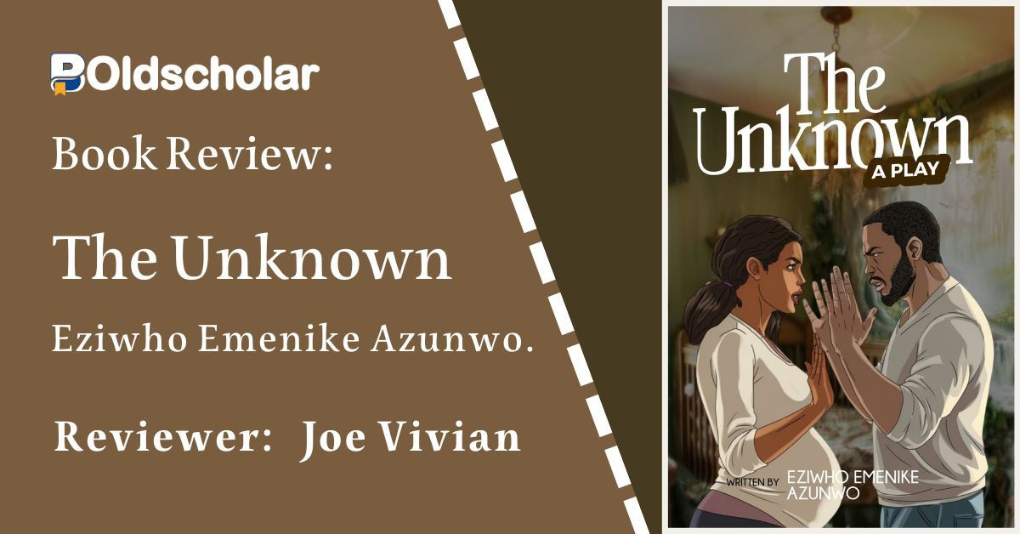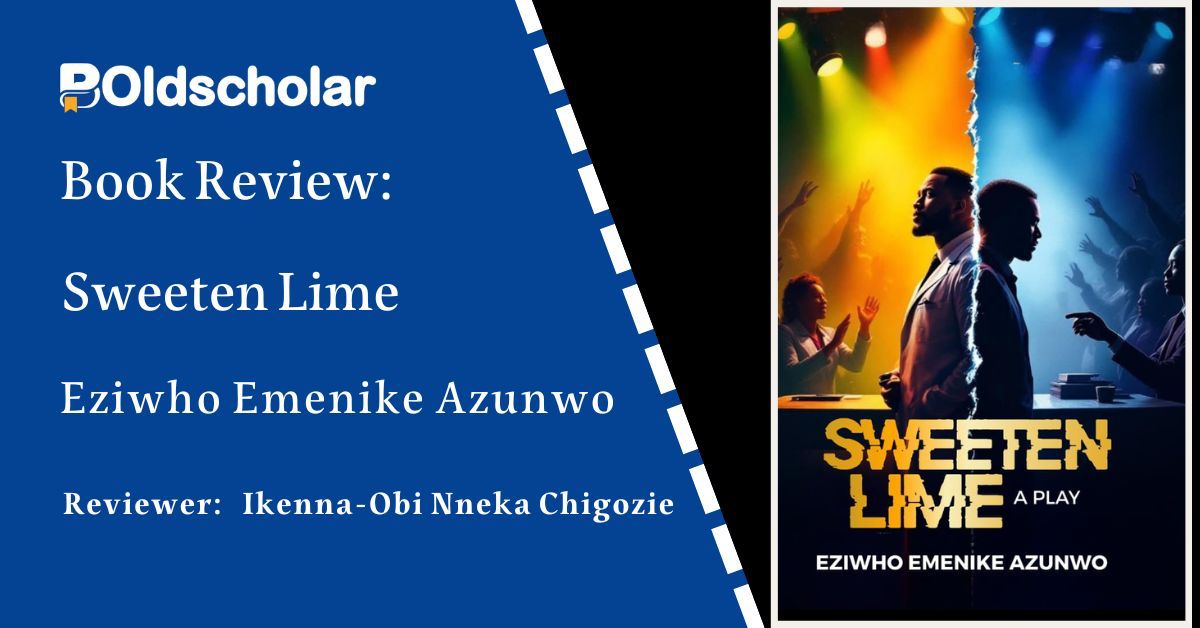Book Title: The Unknown
Genre: Drama
Author: Dr. Eziwho Emenike Azunwo
Reviewer: Joe Vivian
Publisher: Covenant Daystar Publishers
Pagination: (number of pages) 65 pages
Year of Publication: 2025
Institution: Rivers State University, Port Harcourt.
Department of Theatre and Film Studies.
Introduction
Eziwho Emenike Azunwo’s The Unknown is a daring and emotionally resonant theatrical work that examines the devastating weight of loss, the lingering presence of grief, and the mysterious boundaries between the living and the dead. Through its complex characters, metaphysical undertones, and intense emotional landscape, the play offers a profound meditation on trauma, memory, and the unrelenting grip of unresolved sorrow.
This review critically engages a thoughtful and analytical evaluation of the play’s content, structure, characters, and thematic depth. It highlights the playwright’s skill in handling complex themes with sensitivity and depth. This review appreciates Azunwo’s use of poetic language, silence, and symbolism through drama to evoke strong emotional responses. For potential viewers or readers of the play, the review prepares them for the kind of emotional and intellectual experience The Unknown offers. It signals that this is not a conventional drama, but a reflective and haunting exploration of human suffering.
Ultimately, The Unknown is more than a tale of personal tragedy it is a meditation on the human condition. It speaks to anyone who has loved and lost, who has searched for meaning in the aftermath of absence. With a mix of realism and ghostly metaphor, the play confronts the painful truth that grief is not just an event, but a place we often live in long after the loss has occurred. Azunwo’s The Unknown is a powerful theatrical experience that lingers like the memory of a loved one, unseen but ever-present.
Plot and Structure
At its core, The Unknown tells the story of Jambo, a man whose dreams and expectations are cruelly shattered when his wife dies in childbirth, taking their unborn child with her. What should have been a moment of celebration and joy becomes a nightmare, setting the stage for a story that is less about death itself and more about what comes after it, the mourning, the questions, the silences, and the eerie sense of absence that refuses to dissipate.
The play unfolds in a largely linear narrative, but Azunwo weaves in elements of the supernatural that destabilize our sense of time and reality. The structure supports this duality: while grounded in Jambo’s very real, very human experiences of grief and confusion, it slowly spirals into a psychological and metaphysical space, culminating in the ghostly return of Mrs. Jambo at her funeral. This haunting moment is not only a dramatic high point but also a thematic revelation, as it disrupts the boundaries between past and present, life and death. The brilliance of The Unknown lies in its refusal to offer easy answers. The play does not attempt to resolve the mystery of Mrs. Jambo’s return, nor does it tidy up the emotional chaos that follows. Instead, it honors the complexity of grief; its surreal edges, its moments of irrationality, and its capacity to stretch the limits of the human psyche.
Themes and Symbolism
Azunwo explores several deep and often unsettling themes:
- Grief and Psychological Collapse: Jambo’s journey reflects the disorienting and destabilizing nature of grief. His emotional unraveling is portrayed with sensitivity and nuance, highlighting how the mind seeks meaning or comfort even in the most irrational or inexplicable ways.
- The Supernatural as a Metaphor: The appearance of Mrs. Jambo’s spirit functions on multiple levels. It is literal within the world of the play, but also symbolic; a representation of memory, guilt, and the weight of unspoken emotions. Her ghost becomes a vessel for what remains unresolved in both Jambo and those around him.
- The Silence Around Pain: The play also critiques societal expectations around grief. There’s an undercurrent of commentary on how communities deal with, or fail to deal with deep emotional trauma. The silence of others around Jambo, their discomfort with his breakdown, is as haunting as the ghost itself.
- Love and Regret: Love lost too soon becomes a source of torment, and Jambo's regret over things left unsaid or undone adds another layer of emotional complexity. The play suggests that the dead are not the only ones buried, so too are the emotions of the living, often locked away beneath the veneer of "moving on".
Characterization
Jambo is a deeply compelling protagonist. He begins as an optimistic and expectant father, full of dreams and joy. But his transformation following the loss of his family is both heartbreaking and believable. Azunwo avoids clichés by portraying him not as a broken man in dramatic outbursts, but as someone slowly dissolving into himself, consumed by confusion and helplessness.
Mrs. Jambo, though deceased, remains a powerful presence throughout the play. Her ghost is not malevolent, but rather reflective; a mirror of unresolved grief. She does not speak much, yet her mere presence challenges the characters and the audience to reconsider what closures really means.
Secondary characters are used sparingly but effectively. They function as both supports and foils to Jambo’s emotional journey, offering moments of contrast that highlight his isolation.
Language and Style
Stylistically, the play is restrained yet deeply emotional. Azunwo’s dialogue is layered with tension and poetic insight, giving voice to emotions often left unspoken. The structure of the play allows for a slow but impactful unraveling of the characters’ internal landscapes, making the audience complicit in the act of remembrance and mourning.
Azunwo’s language is poetic without being overwrought. The dialogue is filled with lyrical undertones that capture the depth of grief, while still remaining accessible and grounded in natural speech. There’s a rhythm to the play that echoes the beats of mourning- long silences, bursts of emotion, and reflective monologues.
The use of silence, space, and non-verbal cues is especially important in The Unknown. It is not a play that rushes; rather, it sits with its characters’ pain, allowing the audience to feel the full weight of each moment. These silences speak volumes, emphasizing that grief often lives in what is not said.
Staging and Atmosphere
Although the review is textual, The Unknown invites minimalist staging that can powerfully underscore its themes. Dim lighting, spectral soundscapes, and sparse set design would likely enhance the feeling of emptiness and emotional desolation that permeates the play. Mrs. Jambo’s ghostly appearance could be staged subtly, avoiding theatrical gimmicks and instead leaning into the psychological impact of her presence.
Conclusion
The Unknown is a deeply human play that refuses to offer easy answers or emotional shortcuts. Eziwho Emenike Azunwo dares to delve into the uncomfortable spaces where grief festers and memories refuse to fade. It is not a play about the dead, but about those who must continue to live with their absence. With its nuanced characters, layered themes, and haunting moments, The Unknown succeeds as both a theatrical experience and a meditation on the emotional aftermath of loss.
It is a play that will stay with audiences long after the final scene, not because of its ghosts, but because of the truths it quietly and powerfully reveals.
References
Azunwo, E. E. (2025). The Unknown. Covenant Daystar Publishers.
Share this post





Be the first to comment on this post